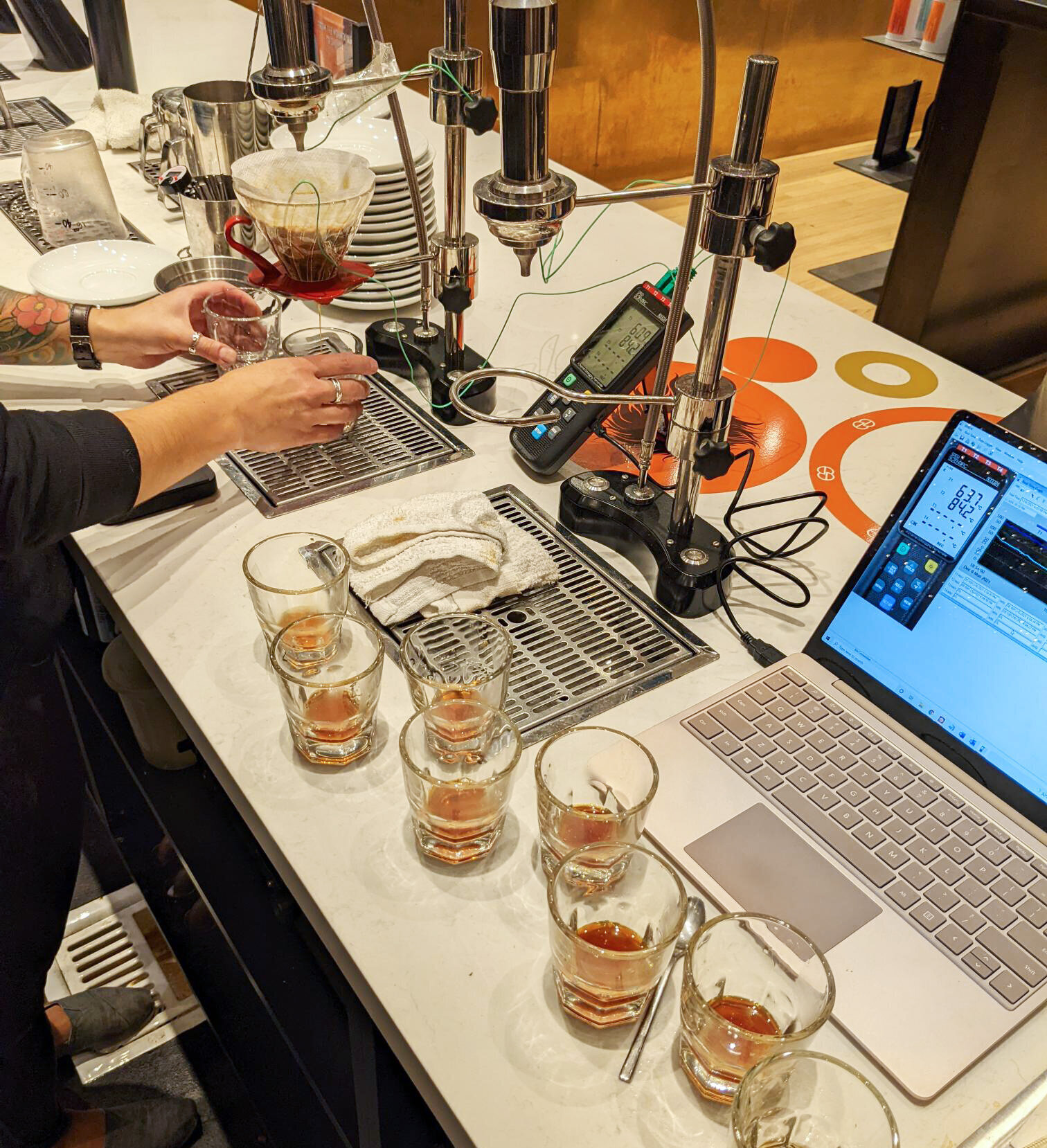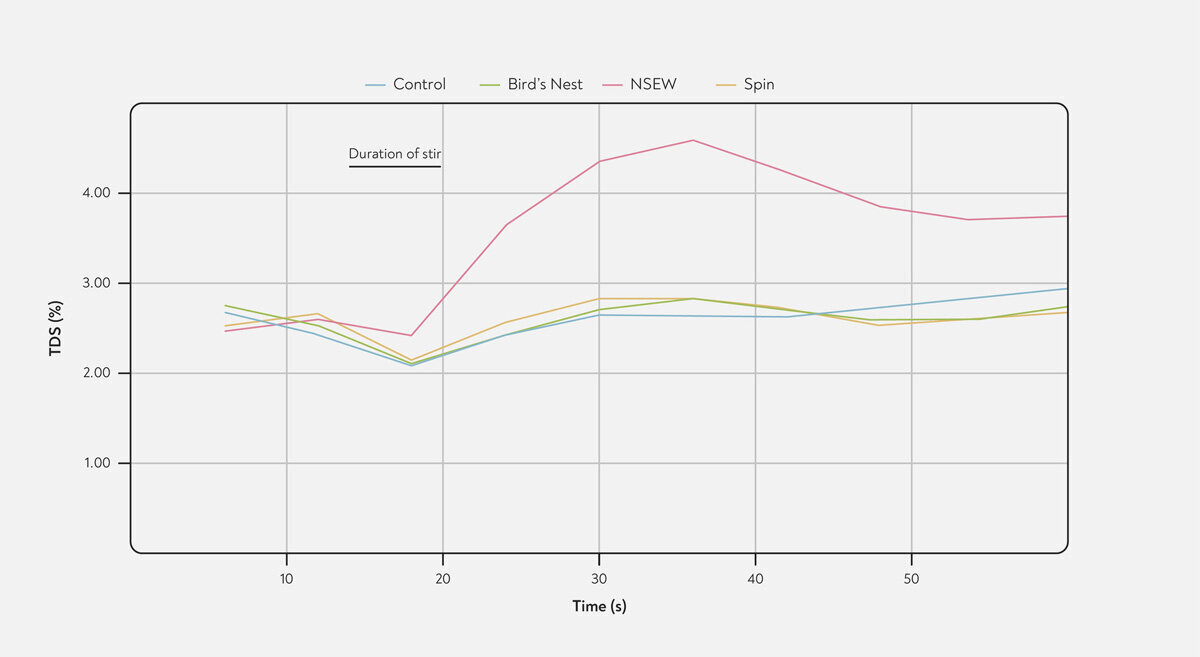
The Rules of Blooming
BH Unlimited Update, Dec 19th 2021.
Noone we've asked this week has been able to tell us definitively how far back the practice of blooming goes, but we're on a mission to find out. What we do know so far is that filtering coffee in one form or another goes back at least as far as the 17th century (Bersten 1993). If you look at some of the old devices such as the De Belloy coffee maker from 1800, the practice of tamping the grinds and keeping them submerged in a little basket became such a standard, that it appears the need for blooming almost went unnoticed, at least into the 20th century. The widespread use of water spreaders (little perforated metal spray heads) also ensured that most devices designed for percolation operated along the same lines as today's batch brewers, even when they were only designed to brew single cups.
If you recall, four weeks ago, we started a series of posts about blooming, first looking at 15-gram doses. What was surprising was that manually stirring the coffee bed during blooming was having the effect of making the coffee absorb less of the bloom water. Sounds like a bad thing, right? So we took this problem to our favourite scientist, Professor Steven Abbott. We came back with a new set of rules, as well as a new and improved testing protocol. We then got testing again, this time with 30-gram doses, and what do you think happened next?
To find out all the details from this latest experiment, read the full post here (free access).
The Putative Rules of Blooming
So here are the putative rules of blooming which Prof. Abbott suggested would be a good basis for designing the new testing procedure. They're not hard rules. If you don't agree with them, we want to hear about it, but we've found it very helpful to see them written down.
- Any water that sees almost no coffee is bad.
- Any coffee that sees almost no water is bad.
- Any brewing at a temperature away from your desired slurry temperature is bad.
- Because there's no universally agreed-upon best method, different methods, batch sizes, and/or different grinds of the same coffee must require different blooms.
- Blocking of the filter by fines is a key problem/opportunity.
What these rules immediately suggested was the need for more sophisticated data. To find out more about rules 1 and 2, Professor Abbott advised us to split the brews into parts to find out how the TDS of each brew played out over time. In the photo below, you can see BH Coach Matthew Brown in action doing just that.
 The experiment underway at Coffeebar in Redwood City, California. The sample cups catch the liquid escaping the bloom and are switched out every six seconds.
The experiment underway at Coffeebar in Redwood City, California. The sample cups catch the liquid escaping the bloom and are switched out every six seconds.
The good news is that after looking into the results of our second blooming experiment, we think we have an idea what method of blooming works best for 30-gram brews. And we're pretty confident we now have a procedure for working out what best suits other recipes.
Take a look at this chart (below). Stirring gives a big bump to the TDS of the liquid escaping the bloom, and the TDS remains elevated right to the end of the bloom. Interestingly, the TDS only seems to increase after the stirring is finished. This suggests that, at least for 30-gram brews, stirring improves the overall contact between coffee and water, with the small caveat that, while the stirring is taking place, the extra liquid escaping has not had such good contact with the coffee. So … we've said it before, you've gotta stir like a bandit ;D.
 Total dissolved solids in the liquid escaping from the bloom. Stirring results in a big increase in TDS, which persists until the end of the bloom phase.
Total dissolved solids in the liquid escaping from the bloom. Stirring results in a big increase in TDS, which persists until the end of the bloom phase.
If a different batch size and method delivers different results, that confirms the idea behind rule four — that there is not one perfect method of blooming, but that different brews benefit from different blooms.
The Coffee Buyer's Guide to Brazil
This week in the Coffee Buyer's Guide we finish our chapter on coffee production in Brazil with an investigation into the cutting edge of processing. We explain why hand-picked, washed coffees — which often represent the pinnacle of high quality in other countries — will always be limited in Brazil. Instead, Brazilian producers are blurring the line between processing methods, by using fermentation to enhance the flavour of natural and pulped natural coffees.
Scientists in Brazil lead the world in identifying the best strains of bacteria and yeast for coffee processing. Researchers in the country have been able to harness the power of microbes to fine-tune the flavour of coffee, increasing cup scores in some cases by as much as 8 or 9 points — a difference that can increase the value of the coffee by 16 times or more.
The producers best placed to take advantage of these developments are large commercial farms that have the financial resources to invest in designer yeast strains and can afford the specialised equipment needed for controlled fermentations. Enterprising specialty growers, however, have found low-tech ways to take advantage of fermentation, using techniques analogous to the production of natural wines or sourdough bread to create new flavours and increase the value of their crops.
This course is available to all BH Unlimited subscribers.
Our Editorial Policy
At BH we never do ads for products on our website. There's no product placement in any of our courses, newsletters or blog posts. Our only income comes from what you pay for your subscriptions. When you see machinery or coffee gear mentioned in any of our educational material, or featured in our course videos, we have chosen to use that equipment because we like using it or because it shows you something you need to see. It's as simple as that.
The Coffee Buyer's Guide to Brazil
Growing, Harvesting, and Processing
CBGB 5.07 • Advances in Processing
CBGB 5.08 • Taking Control of Fermentation
As always, we're just an email away if you have any queries! Have great weeks and we look forward to seeing you next time.
To the Boundaries of Coffee,
Team BH
No comments:
Post a Comment
Note: Only a member of this blog may post a comment.